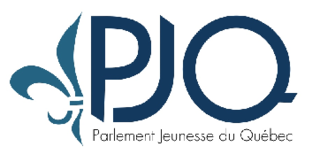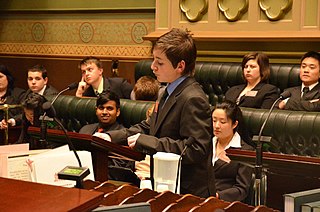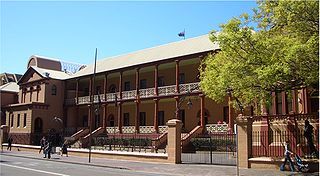A model parliament, also known as a mock parliament, is a system that simulates the parliamentary proceedings of a legislature or deliberative assembly. It typically following the Westminster parliamentary system.
A model parliament, also known as a mock parliament, is a system that simulates the parliamentary proceedings of a legislature or deliberative assembly. It typically following the Westminster parliamentary system.
Model parliaments are usually used as educational tools. They allow students and participants to experience the processes of debate, deliberation, and lawmaking typical of real parliaments and legislatures.
Model parliaments are often based on the rules and procedures of an existing national or sub-national legislature. For example, they may mirror the Parliament of Canada or the United States Congress. This focus on replicating real bodies promotes understanding of how different governments function.
However, model parliaments also serve other purposes beyond pure imitation. Some aim to advocate social or political causes. The Canadian youth parliament movement was founded to advance youth programs across Canada through mock sessions. In Australia, the YMCA run Youth Parliament programs in each state and territory as part of their community outreach.
International organisations also utilise model parliaments for advocacy. Oxfam sponsors an annual "International Youth Parliament" to encourage youth-led social reform worldwide. Participants in this model UN-style event debate issues and propose solutions on topics like poverty, human rights, and sustainability.
Model parliaments have also been used for political protest. In 1914, the women's suffrage movement in Canada organised a parody session of the Manitoba legislature to call attention to the government's refusal to extend the right to vote to women. Led by activist Nellie McClung, this mock parliament helped spark national debate on women's suffrage issues.

Suffrage, political franchise, or simply franchise is the right to vote in public, political elections and referendums. In some languages, and occasionally in English, the right to vote is called active suffrage, as distinct from passive suffrage, which is the right to stand for election. The combination of active and passive suffrage is sometimes called full suffrage.
Women's suffrage is the right of women to vote in elections. At the beginning of the 18th century, some people sought to change voting laws to allow women to vote. Liberal political parties would go on to grant women the right to vote, increasing the number of those parties' potential constituencies. National and international organizations formed to coordinate efforts towards women voting, especially the International Woman Suffrage Alliance.

YMCA Youth and Government (Y&G), also known as Youth In Government, or Model Legislature and Court, is a program of the YMCA of the USA that allows middle and high school students to serve in model governments at the local, state, national, and international levels.

The Workers' Socialist Federation was a socialist political party in the United Kingdom, led by Sylvia Pankhurst. Under many different names, it gradually broadened its politics from a focus on women's suffrage to eventually become a left communist grouping.

Youth Parliament of Manitoba Inc. (YPM) is a non-partisan, non-denominational, and incorporated registered charity based in Manitoba, Canada.

The British Columbia Youth Parliament (BCYP) is a youth service organization that operates in the guise of a "parliament" in the Canadian province of British Columbia. The BCYP fulfills its motto of "Youth Serving Youth" by means of "legislation" enacting community service projects and other youth-oriented activities. The BCYP is the successor to the Older Boys' Parliament of British Columbia, which first met in 1924.

The Ontario Youth Parliament (OYP), formerly the Ontario Older Boys' Parliament, is one of a number of provincial youth model parliaments across Canada. Each year, the organization holds a four-day debate conference on Family Day weekend for youth ages 14 to 21 from Ontario, Canada. The organization has roots within the United Church of Canada dating back to 1907. The first session of the Older Boys' Parliament met in the Ontario Legislative Building at Queen's Park in Toronto in January 1925. As a result, the OYP, as successor to the Older Boys' Parliament, is one of the oldest youth parliaments in Canada. Gordon Lapp of Brighton served as the first Premier.

The Social Democratic Workers' Party was a Dutch socialist political party existing from 1894 to 1946. Originating from a split in the prior Social Democratic League, the party was a predecessor of the current social democratic "Partij van de Arbeid" – literally the "Labour Party".

The Parlement jeunesse du Québec (PJQ) is one of a number of provincial youth parliaments across Canada. Each year, about a hundred of young participants, aged between 18 and 25, meet up in Quebec to discuss and debate like the real politicians. It aims to reproduce the functioning of the parliament of Quebec, the National Assembly of Quebec. Indeed, like the real parliament, the PJQ has its majority party that forms the government, led by the Premier, as well as the official opposition, led by the Leader of Opposition.

The YMCA Youth Parliament is a YMCA run youth model parliament program. There is a YMCA youth parliament in every Australian State and Territory.
The Newfoundland and Labrador Youth Parliament (NLYP) is one of a number of provincial youth model parliaments across Canada.

The Women's Liberal Federation was an organisation that was part of the Liberal Party in the United Kingdom.

A movement to fight for women's right to vote in the United Kingdom finally succeeded through acts of Parliament in 1918 and 1928. It became a national movement in the Victorian era. Women were not explicitly banned from voting in Great Britain until the Reform Act 1832 and the Municipal Corporations Act 1835. In 1872 the fight for women's suffrage became a national movement with the formation of the National Society for Women's Suffrage and later the more influential National Union of Women's Suffrage Societies (NUWSS). As well as in England, women's suffrage movements in Wales, Scotland and other parts of the United Kingdom gained momentum. The movements shifted sentiments in favour of woman suffrage by 1906. It was at this point that the militant campaign began with the formation of the Women's Social and Political Union (WSPU).
Model Congress gives students a chance to engage in a role-playing simulation of the United States Congress. Such events are hosted by the Congress itself, Rutgers University, American International College, University of Maryland, Columbia University, Princeton University, the University of Pennsylvania, Yale University, The College of William and Mary, Harvard, Maggie L. Walker Governor's School, Hamburg Area High School, and Northgate High school.
Politics is the process by which groups of people make decisions. Although the term is generally applied to behavior within civil governments, politics is observed in all human group interactions, including corporate, academic, and religious institutions. Politics consists of "social relations involving authority or power. The definition of "politics" from "The Free Dictionary" is the study of political behavior and examines the acquisition and application of power. Politics study include political philosophy, which seeks a rationale for politics and an ethic of public behavior, and public administration, which examines the practices of governance.
The history of feminism in Canada has been a gradual struggle aimed at establishing equal rights. The history of Canadian feminism, like modern Western feminism in other countries, has been divided by scholars into four "waves", each describing a period of intense activism and social change. The use of "waves" has been critiqued for its failure to include feminist activism of Aboriginal and Québécois women who organized for changes in their own communities as well as for larger social change.

The Reform movement in Upper Canada was a political movement in British North America in the mid-19th century.

The YMCA New South Wales Youth Parliament is an apolitical YMCA Youth Parliament program coordinated by the YMCA NSW, and acts as an advocacy platform for young people in New South Wales aged 15 to 18. Participants spend time in Committees developing mock Bills, which they debate during a week-long camp in the NSW Parliament. Bills are given Royal Assent by the Youth Governor and handed to the NSW Government and Opposition for consideration.

The Political Equality League was a group active in Manitoba, Canada between 1912 and 1916 that successfully lobbied for women's suffrage at the provincial level. One of the highlights of the campaign was a mock parliament in which Nellie McClung parodied the Conservative premier Rodmond Roblin, with a parliament of women dismissing men's claims for rights using the same arguments used by men to dismiss women's claims.